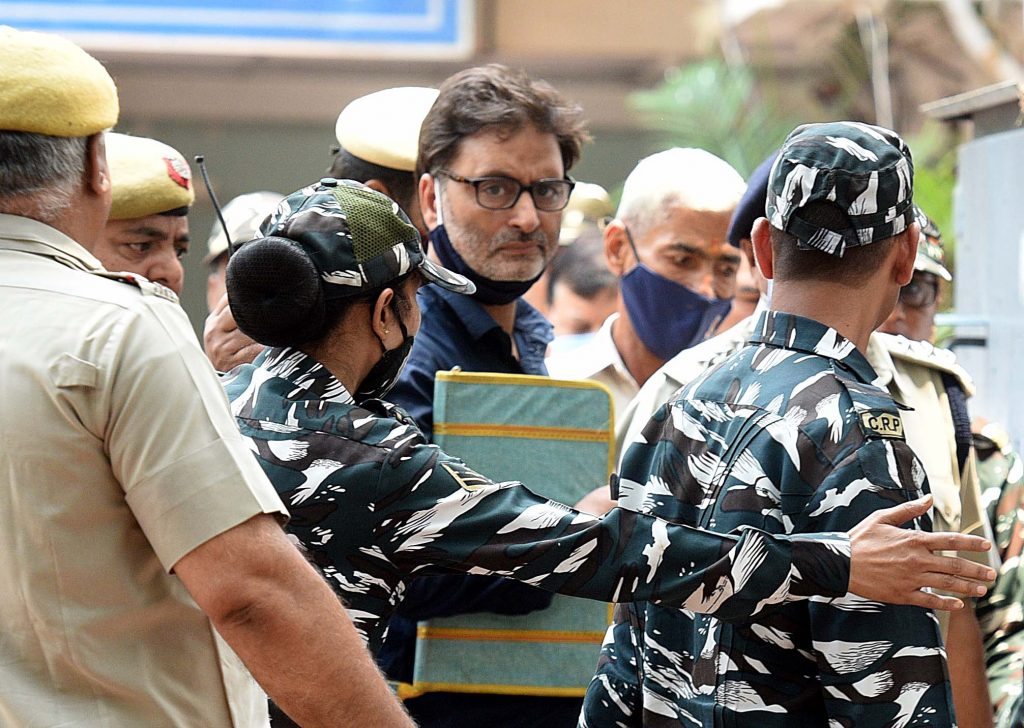
DG (Prisons) Sanjay Beniwal said that a Deputy Superintendent, two Assistant Superintendents and a head warder have been suspended at Tihar for the fiasco of the physical production of JKLF chief Malik before SC bench without its prior permission to do so, writes Mudit Mathur
In the Supreme Court, a controversy erupted over the serious security lapse of Tihar jail authorities who allowed the appearance of Jammu and Kashmir Liberation Front (JKLF) commander Yasin Malik on July 21 in the wake of notice issued to him by the court. Malik is undergoing life sentence in the cases of terror funding and various terrorist actions.
When the Bench of Justice Surya Kant and Justice Dipankar Dutta took up criminal appeals filed by Central Bureau of Investigation against the orders of 3rd Additional Session Judge (TADA/POTA) of Jammu, Yasin Malik came up to argue his own case but the apex court orally clarified that it had passed no order allowing his personal appearance.
The court had already stayed impugned orders on last hearing on 24th April this year wherein it issued notices for 21July, 2023 to 12 respondents including Mohd Yasin Malik. The Superintendent of Prisons, Central Jail, Tihar, vide its letter dated 26.05.2023 forwarded the affidavit of respondent No.1Yasin Malik S/o Ghulam Qadir Malikin response to notice, requesting therein to allow enter appearance as in person.
“Why does he want to appear in person? These days there is a virtual option. This is the best thing without compromising anything,” Justice Surya Kant, who headed a two-judge bench, said. While Justice Datta recused from the case, the bench was taken aback when it learnt that Malik was present despite the fact that no order seeking his physical presence was passed by the court. Malik did not speak at any time during the hearing.
Solicitor-general Tushar Mehta blamed the Tihar authorities for bringing Malik to court, saying: “There is a huge security risk and he is a high-risk individual who cannot be taken out of prison.”
The apex court was hearing a CBI appeal against an anti-terror court’s order in September in connection with the killing of four air force personnel and the 1989 abduction of Rubaiya Sayeed, daughter of the then Union home minister Mufti Mohammed Sayeed.
The NIA court in Jammu had directed Malik, an accused in these cases, to appear personally before it so that he could cross-examine certain prosecution witnesses. In its appeal, the CBI argued that Malik was a threat to national security and could not be allowed outside jail. The Supreme Court stayed the Jammu’s court orders in its earlier hearing in April this year.
However, the agency’s appeal did not have an effective hearing on 21st July as the other judge on the bench, Justice Dipankar Datta, recused himself. Justice Kant then referred the matter to Chief Justice of India D.Y. Chandrachud for the constitution of another bench to hear the matter after four weeks.
Mehta emphasized that the Union home ministry had issued a notification under Section 268 Cr.PC that empowered the government to direct “that any person or class of persons shall not be removed from the prison in which he or they may be confined or detained”. He said this had been applied to Malik, yet jail authorities had brought him to the Supreme Court.
“It is a serious security issue,” Mehta protested and assured the court that it would not be allowed to happen again. Tihar jail is under the control of the Arvind Kejriwal-led Delhi government.
Solicitor General Tushar Mehta later wrote to Union Home Secretary Ajay Bhalla flagging JKLF commander Yasin Malik’s appearance on Friday in the Supreme Court as a “serious security lapse”. “A person with terrorist and secessionist background like Yasin Malik, who is not only a convict in a terror funding case but has known connections with terror organisations in Pakistan could have escaped, could have been forcibly taken away or could have been killed,” the letter said.
“Even the security of the Supreme Court also would have been put to a serious risk if any untoward incident were to happen.” “I consider this to be a matter serious enough to once again bring it to your personal notice so that suitable action /steps can be taken at your end,” the Solicitor General wrote.
Meanwhile, Director General (Prisons) Sanjay Beniwal said the prison department has suspended a Deputy Superintendent, two Assistant Superintendents and a head warder as they were found to be “prima facie” responsible in a preliminary enquiry into the fiasco of the physical production of JKLF chief Yasin Malik before a Supreme Court bench. “A detailed inquiry is being conducted by DIG (HQ) Tihar, Rajiv Singh, to identify any other officials who may also be responsible for the serious lapse,” he added.
Case against Yasin Malik
Yasin Malik, head of the JKLF, was arrested by the NIA in 2019 in connection with an overarching terror-funding case that it had opened in 2017. In its FIR, the NIA said Kashmiri separatists were receiving funds from Pakistan, including from Hafiz Saeed of the Lashkar-e-Taiba and Syed Salahuddin of the Hizb-ul-Mujahideen, to foment trouble in the Valley through stone-pelting, burning down of schools, and organising strikes and protests.
The NIA investigations revealed: “Yasin Malik has been involved in more than 65 criminal cases. Most of them are of murder, attempt to murder, rioting and sedition. Besides, abducting of Rubaiya Sayeed, daughter of the then Union Home Minister, Mufti Mohammed Sayeed in 1989, he is also involved in killing of four Indian Air Force personnel in the early part of 1990s. “The NIA arrested over a dozen separatists in the case, including Malik, Shabir Shah of the Jammu and Kashmir Democratic Freedom Party and Asiya Andrabi of the Dukhtaran-e-Millat.
The agency has claimed that the protests, which followed the killing of Hizb-ul-Mujahideen militant Burhan Wani in July 2016, caused death and injuries to civilians and security forces. In these violent protests orchestrated by Malik, 89 cases of stone-pelting were reported, the NIA has said.
Malik was arrested many times. He was arrested from the house of Watali along with other “militants namely Sajjad Lone, Sheikh Abdul Hamid, Yasin Khan and Firdous Masoodi with arms and ammunition on August 6, 1990. In May 1994, after being released on bail, Malik declared an indefinite ceasefire on behalf of the JKLF, and “renounced violence”. This was not acceptable to many in the outfit, which led to a split.
Terror funding charges
The NIA has claimed that Kashmiri businessman Zahoor Ahmad Shah Watali was one of the main hawala conduits who generated and received funds from Pakistan, the ISI, and the UAE using various shell companies that he had floated to disguise foreign remittances, and transferred the funds to separatist leaders and stone pelters in the Valley.
NIA claimed its investigations had found that Malik not only received funds from Pakistan to foment trouble in the Valley, but had also acquired properties valued at more than Rs 15 crore. The agency has alleged that Malik was allegedly in constant touch with the ISI through his Pakistani wife, who is “very close to” the spy agency.
It is also alleged that Malik and his associates had grabbed government land and usurped properties belonging to Kashmiri Pandits. The report listed 12 alleged benami properties of Malik in Bohrikadal, Mirgund, Bemina, Maisuma, Abi Gujar and Kanipura in Srinagar, and put the cumulative value of seven of these properties at Rs 12 crore. He allegedly possesses five properties in prime areas of Srinagar, including Lal Chowk. The properties include those held in the names of Malik’s sisters, associates, and his maternal uncle.
The report also alleged that Malik had a stake in a popular chain of schools in Kashmir, and had grabbed a government property in Gobachibag, which he had initially taken to run a school. He also has a stake in a housing colony being built in Nowgam, the NIA said.












